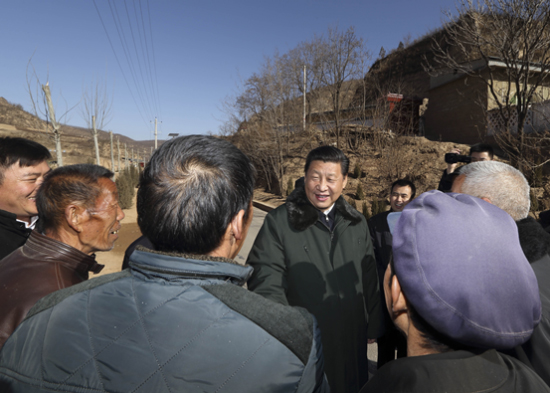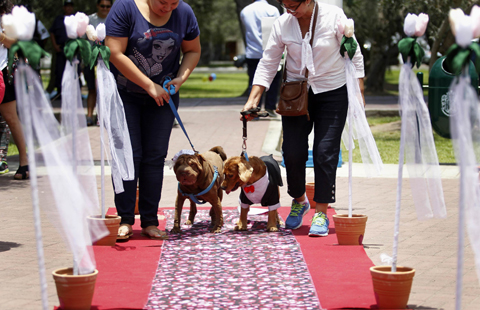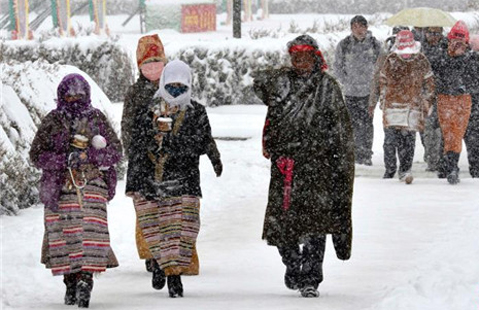President Xi's New Year visit marks village homecoming
Updated: 2015-02-14 21:22
(Xinhua)
|
||||||||
 |
|
Chinese President Xi Jinping meets villagers in Northwest China's Shaanxi province, Nov 14, 2014. [Photo/Xinhua] |
YAN'AN, Shaanxi -- At the entrance to a village in Northwest China's Shaanxi province, the villagers had been waiting. They were excited and called him by his first name: Jinping.
Forty-seven years ago, a teen Xi Jinping came to Liangjiahe as part of a campaign launched by Chairman Mao Zedong that asked urban youth to experience rural labor life.
On Friday, Xi, now leader of more than 1.3 billion people, returned to the village in Shaanxi to extend Spring Festival greetings to locals in old revolutionary base areas.
During his seven years in the village, Xi lived in a cave dwelling with villagers, slept on a kang, a traditional Chinese bed made of bricks and clay, endured flea bites, carried manure, built dams and repaired roads. It was also here that he joined the Communist Party of China.
"Ying'er, you've grown old," said Xi, who immediately recognized villager Wang Xianjun and called him by his nickname. The two reminisced about building mud dams together to hold water for irrigating the dry land.
In front of them was the cropland Xi, who was village Party chief at the time, helped to cultivate alongside locals with their dam-building efforts. It is still growing crops.
Villagers waiting for Xi filled the courtyard of the village Party branch and Xi recognized the faces of more comrades.
"It's really exciting to be back and see everyone. In January 1969, I took the first step of my life to come to Liangjiahe and stayed a whole seven years. When I left, I left my heart here," Xi said.
After Xi first came to the village, several families took turns taking him in. In 1970, six cave dwellings were built especially for young people from the cities, and Xi lived there until he left.
Xi recalled late-night readings under the light of kerosene lamps and a wedding he attended for a family that once housed him.
Talking with 68-year-old Gong Zhengfu, Xi joked, "You were really strong back then and the best wrestler in the village, but you couldn't beat me."
Walking along a steep slope, Xi pointed to a group of cave dwellings tucked into a mountain valley and another mountain ridge where he used to chop wood and herd sheep. "Forty years since leaving," he murmured, apparently lost in thought.
Xi revisited the village in 1993 and has written letters to the villagers four times to encourage them to work hard and improve their lives.
This time, he returned with his wife Peng Liyuan, whom he introduced to the villagers in the local dialect. He focused on the village's progress in poverty relief and also brought gifts for the Spring Festival purchased with his own money, including flour, rice, cooking oil, meat and festival-themed paintings.
Xi inquired about the villagers' incomes, crops, livestock, medical insurance and the village's infrastructure and land preservation. He was happy to learn that tap water and Internet are available in the village and annual income per capita had reached 9,600 yuan (1,560 U.S. dollars).
As Xi wrote in one article, he felt perplexed when he came to the "yellow earth" at the age of 15, but upon leaving at 22, he was confident and carried a firm goal: to serve the people. This goal was born there in the Loess Plateau, where the Communist revolutionaries rose to found the New China.
Xi told young people not to belittle the village they live in. "This place has great knowledge in store, and if you are careful enough, you can find something to learn anywhere."
"I believe the future of this place will be even better, and I want to see that the next generation will grow up to be good and do things to benefit the people," Xi added.
Most Viewed
Editor's Picks

|

|

|

|

|

|
Today's Top News
China to import more iron ore from Vale
Mexico makes moves to attract more Chinese tourists
Brazil, Peru and China to specify railway details
Growing up recluse in a dazzling world of Manhattan
Apple studies self-driving car: auto industry source
Second-longest railway built overseas by China rolls out
Graft buster publishes corruption cases in environmental sector
2 deadly shootings within hours in Copenhagen
US Weekly

|

|







